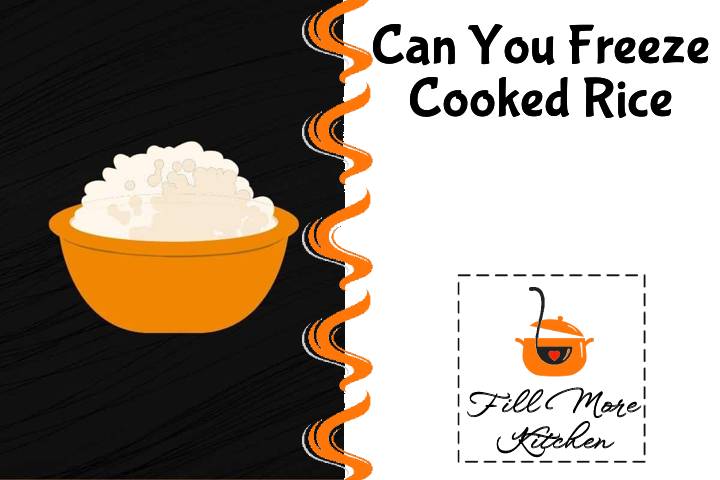On occasions when our schedules are too tight to allow for meal preparation, preparing food in advance and freezing it can be a helpful solution.
Perhaps purchasing pre-cooked food is not feasible for you due to the high cost of these items.
When it comes to freezing food, there may be some uncertainty about which foods are suitable for freezing and which are not, including the question of whether cooked rice can be frozen.
Freezing cooked rice is possible and safe, even if it contains additional ingredients like vegetables; however, it is crucial to store it promptly after cooking to avoid bacterial growth. The frozen rice can be kept in the freezer for approximately a month before its flavor and consistency begin to alter.
Continue reading to discover the proper way of safely freezing your cooked rice and the recommended duration for storage.
How Long Can Cooked Rice Last In the Freezer?
Although freezing cooked rice can extend its storage time, this extension is typically restricted, and it can only be frozen for a maximum of six months after being cooked.
According to some sources, cooked rice can be frozen for up to 8 months without spoiling, which is significantly longer than its refrigerated shelf life of 3 to 4 days.
Occasionally, frozen cooked rice may spoil unexpectedly. If you suspect that your rice is no longer suitable for consumption, there are a few signs to watch out for.
Initially, it is crucial to assess the aroma of your rice. Rancid rice emits an unpleasant or peculiar scent that can be effortlessly identified.
Another thing to consider is checking for mold in your cooked rice. The presence of green, black, or blue spots on the rice indicates that it has gone bad and should not be consumed.
Finally, check the texture of the rice. Expired rice will have a slimy and gooey texture, unlike fresh rice which is fluffy.
Discard frozen rice immediately if you observe or suspect any of the mentioned changes to prevent food poisoning.
What’s the Best Way to Freeze Cooked Rice?
Freezing cooked rice can slow down the growth of bacteria, but it is important to note that it does not eliminate them entirely. Therefore, proper handling and storage techniques are crucial for extending the shelf life of frozen rice.
It is important to let your cooked rice cool down before freezing it to prevent clumping, and avoid packaging it while still warm as this can cause condensation that may affect the quality of the frozen rice.
Wait until the cooked rice has stopped steaming before storing it at room temperature.
If cooked rice becomes sticky after being frozen, it is recommended to add a small amount of oil to prevent the grains from sticking together. However, it is important to avoid adding an excessive amount of oil as this can result in the rice becoming too moist.
Once you have completed the aforementioned procedures, it is now appropriate to move your cooked rice to the container for storage.
If you have added chicken or other components to your rice, it is advisable to store them separately as combining ingredients of varying shapes in one container may result in air pockets that can negatively impact the quality of the cooked rice.
Zip-top bags are recommended for freezing cooked rice as they allow you to remove all the air, which can be difficult with rigid containers. Nevertheless, if zip-top bags are not available or accessible, containers will suffice.
Placing the cooked rice in a container or bag and wrapping it with plastic wrap can prevent freezer burn.
It is important to add the correct quantity of rice to your storage bags or containers. After filling the bag with rice, make sure to remove as much air as possible before sealing it.
To freeze cooked rice, avoid stacking heavy items on top of the bags to prevent breakages and mashing of the grains.
If you plan to freeze cooked rice, it is important to label the container or bag with the current date to keep track of how long it has been frozen, unless you will be consuming it soon.
Should You Defrost Frozen Rice or Reheat Immediately?
Before reheating cooked rice, it is important to defrost it completely as this process can aid in killing some of the bacteria present in the rice, which is typically inactive rather than dead while frozen, before eliminating it entirely by reheating.
Furthermore, thawing your cooked rice enables it to warm up rapidly, unlike frozen or partially frozen rice.
After learning about the advantages of thawing cooked rice before warming it up, how can you accomplish this?
If you need to defrost cooked rice quickly, the most efficient method is to use a microwave. Simply put your rice in a dish that is safe for microwaving, select the ‘defrost’ option, and start the microwave. If the rice appears excessively dry while being microwaved, add some water drops.
If you opt for defrosting your food in the refrigerator, make sure to plan ahead as it may require leaving the cooked rice in the fridge overnight.
If you want to defrost your cooked rice, you can opt for another method which involves putting it under cold running water while it’s still in its containers or bags.
It is recommended to submerge your rice in a sizeable receptacle filled with clean water to prevent contamination.
To prevent water from getting into your rice, make sure to tightly seal the container or bag when thawing it using cold water.
After freezing cooked rice, wait for 10-minute intervals before examining if it has defrosted. To check, take the rice out of its packaging and use a spoon to fluff it and see if there are still frozen parts.
While it is possible to thaw rice and other foods at room temperature, it is not recommended as it may not yield optimal or safe outcomes; therefore, it is best to follow the aforementioned methods.
To prevent contamination, it is important not to mix cooked rice with raw meat while defrosting. Additionally, it is recommended to consume the defrosted rice within one day.
Does Freezing Rice Make It Mushy?
To avoid ending up with mushy cooked rice after freezing, it is important to take the necessary steps to prevent it from becoming too moist.
To prevent the rice from becoming mushy, it is important to freeze it promptly, but make sure to allow it to cool down first; otherwise, freezing it will still result in ruined frozen rice.
Does Frozen Rice Taste Good?
There is a common misconception that freezing cooked rice will negatively impact its taste and consistency, but this is not true.
As long as you freeze your cooked rice properly and avoid leaving it in the freezer for an extended period, it should maintain its flavor.
Proper freezer management is crucial to preserve the flavor of frozen cooked rice and other items stored in the freezer.
Here are some guidelines you can adhere to, to ensure that your freezer is utilized to its fullest potential.
- To ensure the preservation of your frozen cooked rice, it is important to minimize the frequency of opening and closing your freezer door by only doing so when necessary.
- Make sure to place your freezer in a location that is both cool and dry, and maintain a consistent temperature in that area.
- To ensure efficient functioning of your freezer, it is recommended to keep it three-quarters full rather than filling it to the maximum.
- It is important to perform regular cleaning of the condenser coils.
- It is important to thaw your freezer regularly.
Finally, in case your cooked rice has an unusual odor or flavor despite adhering to the proper freezing methods, dispose of it right away to prevent any unnecessary sickness.
You can also check this video about “Can You Freeze Cooked Rice?”
Check out our top 10 reviews!
Related posts
https://fillmorekitchen.com/can-you-cook-raw-chicken-in-soup/
https://fillmorekitchen.com/can-you-eat-chinese-takeaway-food-that-was-left-out-overnight/
https://fillmorekitchen.com/can-you-use-an-oven-after-cleaning-it-yes-but-do-this-first/
https://fillmorekitchen.com/can-i-leave-my-rice-cooker-unattended/
https://fillmorekitchen.com/can-you-put-parchment-paper-in-the-microwave-oven/



